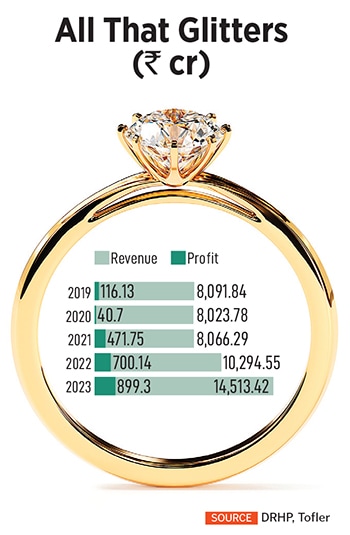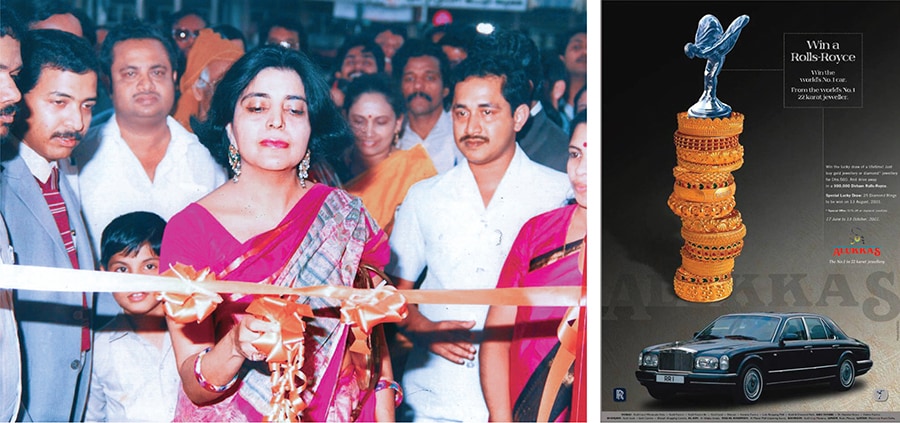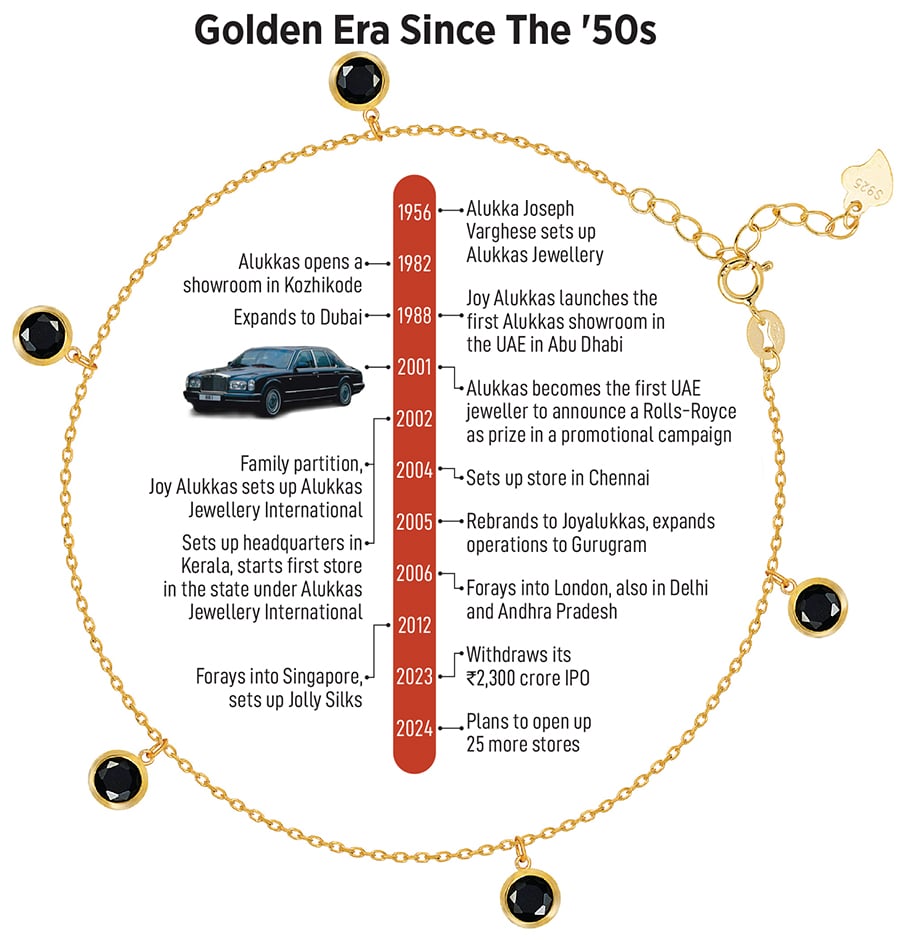How Joy Alukkas became India's richest jeweller
Joy Alukkas is a jewellery retailer with over 100 outlets in India and 60 overseas and a net worth of $4.4 billion. The 712th richest person in the world has been a massive beneficiary of the Indian l


It happened sometime in the early part of the millennium. West Asia was a different place, and Indian expatriates weren’t as prosperous or celebrated as they are today. Somewhere in Kerala, the Alukkas family, a prominent jewellery family from the state"s commercial hub of Thrissur had just completed the partition of the family business between the five male heirs.
Joy Alukkas, the fourth youngest among the five, who led the jewellery group’s foray into West Asia was handed the family’s stores in that region as part of the partition. As he waited to meet his friend, a regional sales head for Mitsubishi and Rolls-Royce in Dubai, the 40-something Alukkas noticed a Rolls-Royce Silver Seraph in the adjacent showroom. Alukkas walked over, took a close look at the vehicle, only to be turned away by the salesman, who perhaps felt that Alukkas wasn’t a potential customer.
Soon enough, as his friend returned, Alukkas, somewhat peeved at the whole episode made an announcement—that he was ready to purchase the car on display, paying upfront for the car that then cost nearly AED 1 million. While Rolls-Royce purchases required prior bookings, Alukkas convinced the dealership, and managed to take home the car, only to be confronted with a stark reality. The decision was on an impulse, and he didn’t really need the car.
 A sharp, canny businessman, Alukkas quickly decided to offer the car to a lucky winner who would purchase gold worth AED 500 from his store in the UAE. It was the first time a Rolls-Royce was being given away in a raffle, and the announcement created something of a furore in the region. In the process, though, the fledgling Alukkas Jewellery became a sensation and propelled the retailer into one of West Asia’s largest gold retailers in a short span.
A sharp, canny businessman, Alukkas quickly decided to offer the car to a lucky winner who would purchase gold worth AED 500 from his store in the UAE. It was the first time a Rolls-Royce was being given away in a raffle, and the announcement created something of a furore in the region. In the process, though, the fledgling Alukkas Jewellery became a sensation and propelled the retailer into one of West Asia’s largest gold retailers in a short span.
"One must seize opportunities and take them," Alukkas tells Forbes India. “This doesn"t mean sitting around and waiting for a lucky break. I don"t believe in luck. Rather, I believe we make our luck." In that also lies the remarkable story of Joy Alukkas, once considered something of a pariah by his brothers in the family business, not competent enough to run it.
Today, Joy Alukkas runs the Joyalukkas Group, a jewellery retailer with over 100 outlets across India and 60 overseas, and is listed as the 712th richest man in the world, according to the Forbes World’s Billionaires List 2024. Alukkas is India’s richest jeweller, with a net worth of $4.4 billion, up from $2.8 billion in 2023. His India stores are located in Mumbai, Delhi, Bengaluru, Chennai and Hyderabad, among others.
As much as 90 percent of the company’s revenues in the country come from Kerala, Tamil Nadu, Karnataka, Andhra Pradesh, and Telangana. This is followed by the northern and western markets, primarily Maharashtra, where the company now sees enormous potential to expand. All its stores, unlike some of its competitors, are on leased land.
 Alukkas Jewellery opened its first store in Abu Dhabi in 1988 (left) it made waves for giving away a Rolls-Royce Silver Seraph in a raffle
Alukkas Jewellery opened its first store in Abu Dhabi in 1988 (left) it made waves for giving away a Rolls-Royce Silver Seraph in a raffle
“Our plan is to open 25 more stores this year, and continue with the stores we have," Alukkas says. “We give joy along with selling gold. Our service, varieties, store locations and the focus on training our staff are what have worked for us all these years." Apart from India, the company operates stores in the UAE, the US, the UK, Saudi Arabia, Qatar, Bahrain, Kuwait, Oman, Singapore and Malaysia, employing over 9,000 staff.
Alukkas was born the 11th among 15 siblings to Kerala-based businessman Alukka Joseph Varghese. The senior Alukka had made his living dabbling in various businesses that included umbrella manufacturing, selling clothes, real estate and earthen pots. In 1956, the year Joy Alukkas was born, the family set up a jewellery shop in Thrissur.
A few years later, the family shut down that business and focussed all its attention on an umbrella manufacturing unit and a radio shop. By 1964, a few years after the Sino-India war that forced the government to announce gold import restrictions, the Alukkas family was back in the world of jewellery, this time with a focus on silver.
In 1968, the government announced the Gold Control Act, which allowed the likes of Alukkas to apply for a licence. The Act allowed individuals and families to only hold up to 2 kg and 4 kg of gold, and only in the form of jewellery. The Act also prohibited imports of gold other than jewellery. A licence meant the jewellers could stock 2 kg of gold per artisan that they employed while goldsmiths could hold up to 100 grams on licence.

“In those days, Thrissur was the hub for the gold jewellery business in Kerala," Alukkas says. “People would come from various parts of the state to buy gold there." Thrissur, Kerala’s third-largest urban agglomeration after Kochi and Kozhikode, is a commercial hub, with several banks, including South Indian Bank and Catholic Syrian Bank, being headquartered there. In addition, numerous gold and textiles businesses, including the Kalyan Group, are headquartered in Thrissur.
Over time, the five male siblings joined the family business, with Jos, the eldest, leading the pack, while Alukkas wanting to do more than being a cashier at the stores. “Nobody used to think out of the box," he says. “They were happy sitting at the counter." By the early 1980s, the Alukka family expanded their business from Thrissur to the coastal city of Kozhikode, a trading hub.
Opening a store in Kozhikode, a city that had seen large migration to West Asia as the Gulf boom gathered pace, brought in significant growth for the Alukka Group. In fact, it was the success of the Alukka Group in Kozhikode that prompted other jewellers, including the likes of Malabar Gold, to foray into gold retail. In the meantime, as business thrived, the family had also identified West Asia, with a large Malayali diaspora, for the next phase of growth.

But, between the brothers, none was keen to move to West Asia and set up the business. Alukkas, though, raised his hand and convinced his family that he would move there, even though he had faced taunts about his lack of expertise in the jewellery business. “There were a lot of Indians there, especially Malayalis," Alukkas says. “They were buying gold. Whatever they earned... about 80 percent was spent on buying gold. India had the Gold Control Act, and the price difference was more than five times."
Alukkas soon set sail to West Asia, first to Ras Al Khaimah, followed by setting up his business in Abu Dhabi, where the first Alukkas store was opened in 1988. Over the next 12 years, Joy would go on to set up nine more, before a family split led to the brothers deciding to demarcate their businesses and take on different identities. By then, the West Asia business was making more than $100 million annually.
In 2002, the Alukkas family split, with Joy Alukkas being handed control of the West Asia business. The family had also built up a huge real estate bank. His brothers Jos, Paul and Francis took control of various stores in Kerala, and continue to run their own retail businesses. Jos has 49 stores spread largely across southern India, followed by Francis at six stores, all of them in Kerala. Paul, another brother, operates two retail stores in Kerala, in addition to being a real estate developer while, the youngest brother, Anto, is no longer in the jewellery business.
“I could do whatever I wanted. You have full freedom then to do what you want as an entrepreneur," Alukkas says about the family split. “I had set a dream that by 2010, I will have 100 showrooms in 10 countries. I managed to do that before 2010 itself." The company that Joy Alukkas was to lead was renamed Alukkas Jewellery International, with a focus on Indian expatriates.
 From left: Joyalukkas stores in Vijayawada, the UK and Malaysia
From left: Joyalukkas stores in Vijayawada, the UK and Malaysia
By 2005, the company was renamed Joyalukkas, and over the next few years it went on a massive expansion spree, setting up stores in Chennai, Delhi, Mumbai and Kerala, among others. Of these, the Chennai store became the world’s largest gold showroom. Today, an average Joyalukkas store is around 5,800 sq ft. “2006 was our golden year," Alukkas says. “We went on a spree... opening stores across the country."
India’s organised jewellery business, which comprises the likes of Joyalukkas, Kalyan Jewellers, Titan, Malabar Gold and Senco, among others, contributes to about 32 percent of India’s gold purchases. The country is the world’s second-largest consumer of gold, and consumption stood at 747.5 tonne in 2023, according to World Gold Council (WGC) data. Demand for gold jewellery in 2023 stood at 562.3 tonne compared with 2022, according to WGC. This year, the WGC expects gold consumption to rise to 900 tonne, even as prices rise, signalling huge growth for retailers.
The Indian love affair with gold has also meant that retailers have ramped up efforts to grow their stores, moving away from their traditional hubs to newer frontiers. Jewellers such as Kalyan Jewellers and Malabar Gold, which were focussed on the southern market, PC Chandra Jewellers or Senco Gold in the east, and Tribhovandas Bhimji Zaveri in the west have all been expanding their pan-India presence, either through their stores or via franchises.
“Despite being a predominantly Kerala-based jeweller, it has built up huge success in other southern markets," adds Bisen of Technopak. “With 10 percent sales coming from outside southern India now, indications are pointing towards early success. For a customer what matters is a trusted national brand, and in that they have been quite successful."
“We will be adding 25 new stores in Telangana, Andhra, Karnataka, Tamil Nadu, Maharashtra, Uttar Pradesh, Punjab, Delhi and the UAE," Alukkas says. “We will also mark our presence in two more countries by launching showrooms in Australia and Canada. There is scope in India to open 1,500 stores more. The Indian customer always buys gold to use... that eventually becomes an investment."
Still, competition could throw in challenges. Malabar Gold, Joyalukkas’s rival from Kerala, claims to have achieved a record turnover in excess of `50,000 crore in the last fiscal. Currently, Malabar Gold & Diamonds operates 345 stores across 13 countries, with plans to open new stores in New Zealand, Egypt, Bangladesh, and more locations in Europe, in addition to opening stories at a rapid pace in India’s smaller towns.
Others such as Kalyan Jewellers, Senco and Titan are also ramping up stores, relying on franchise models to scale up their presence in the country. For instance, between September and December last year, Kalyan Jewellers added 22 new showrooms, of which 16 were under the franchise model. The company now plans to add 80 more stores in 2025, significantly higher than Joyalukkas. Alukkas doesn’t operate a franchise model.
“We don’t have such plans," Alukkas says about following a franchise model that has now come to define the gold retail industry. “We are approached for it, and we might consider it only if we do an IPO [initial public offering]." Last year, the company withdrew its IPO worth `2,300 crore citing poor market sentiments. “We have enough for a minimum growth at the moment," Alukkas says.
But that doesn’t mean the company isn’t trying out new frontiers. It has a textiles business, with stores spread across Kerala. While Alukkas says he has no plans of expanding that line, one of his daughters and sons-in-law are busy ramping up a currency exchange business, spread across 92 stores in three countries. Alukkas’s son looks after the overseas and West Asia business, while his other daughter and son-in-law have joined the business to look at the Indian operations.
“Increasing regulations in the jewellery retail industry, aimed at improving transparency and standardisation over the recent years have accelerated the shift in the market share from unorganised players," said ratings agency ICRA in a note on Joyalukkas last year. “The industry tailwind is expected to benefit the organised jewellery retailers like Joyalukkas India Limited over the medium term, supported by its strong brand equity and increasing retail presence."
For now, though, at 67, Alukkas has no plans to hang up his boots and let the next generation take over. He is busy moving Joyalukkas’s headquarters from Kerala to Bengaluru to capitalise on better technology, talent, and accessibility, as it plots its national play. Until now, the company’s headquarters was in Thrissur. “Even now, I am very hands-on," Alukkas says. “The jewellery owners used to be lazy and very conservative. I changed a lot of that. You must always be willing to explore."
Decades ago, the Rolls-Royce was truly a game changer. At 67, Alukkas still has many tricks up his sleeve, and lots to play for.
First Published: Apr 29, 2024, 13:27
Subscribe Now